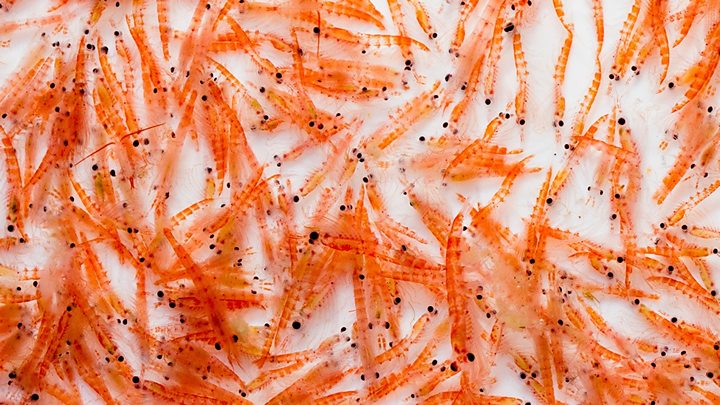Another species of krill is a keystone here along our north Atlantic coast. And they too will be moving ... but north ... taking other important species with them.
**********************************************************
By Jonathan AmosBBC Science Correspondent, 21 January 2019

A keystone prey species in the Southern Ocean is retreating towards the Antarctic because of climate change.
Krill are small, shrimp-like creatures that swarm in vast numbers and form a major part of the diets of whales, penguins, seabirds, seals and fish.
Scientists say warming conditions in recent decades have led to the krill contracting poleward.
If the shift is maintained, it will have negative ecosystem impacts, they warn.
Already there is some evidence that macaroni penguins and fur seals may be finding it harder to get enough of the krill to support their populations.
"Our results suggest that over the past 40 years, the amount of krill has, on average, gone down, and also the location of the krill has contracted to much less of the habitat. That suggests all these other animals that eat krill will face much more intense competition with each other for this important food resource," Simeon Hill from the British Antarctic Survey told BBC News.
The study is published in the journal Nature Climate Change.
It focuses on the Scotia Sea and the Antarctic Peninsula - the places where the crustaceans are most abundant.
Scientists have been gathering data in these areas since the 1920s.
Initially, krill catches were recorded to understand the environmental consequences of commercial whaling, but the information has continued to be collected through to the present.
Dr Hill and colleagues say the change in the distribution and density of the crustaceans is a clear signal that emerges in the data from the late 1980s onwards.
It coincides with a phase change in a climate oscillation known as the Southern Annular Mode.
The SAM essentially describes the dominant pattern of pressure zones in the southern hemisphere outside of the tropics.
The mode's switch in state in the late 80s produced warmer, cloudier, windier weather, and much less sea-ice in those areas where the krill had tended to congregate.
The larval stage of the crustaceans in particular has been strongly associated with the presence of a sea-ice habitat.
Predicted changes under way
The team's analysis indicates the centre of krill distribution has now moved to where more favourable conditions are found, tracking southward towards the Antarctic continent by about 440km, or four degrees of latitude.
"The average size of krill has lengthened over this period of time as well," said Dr Hill.
"And that's because the population has increasingly become dominated by older and larger animals. This is a result of a decline in the number of krill entering the population - what we call juvenile recruitment."
Margaret McBride, from the Norwegian Institute of Marine Research in Bergen, has written a comment article on the research in the same edition of Nature Climate Change.
She said models had predicted that krill would shift southwards in the future, whereas the new research suggested this contraction was already under way.
"It offers a profoundly adverse, but highly plausible, endgame for Antarctic krill that has serious implications for both the Southern Ocean food web and sustainable management of fisheries targeting this species," she wrote.
The krill do not only support marine mammals and seabirds; an international fishery also extracts something on the order of a quarter of a million tonnes of the crustaceans each year in the Antarctic region.
The campaign group WWF-UK said the study showed "the need to protect the waters off the Antarctic Peninsula with an effective network of marine protected areas - placing conservation above fishing interests."
Jonathan.Amos-INTERNET@bbc.co.uk
See the full article at: Antarctic krill: Key food source moves south - BBC News
